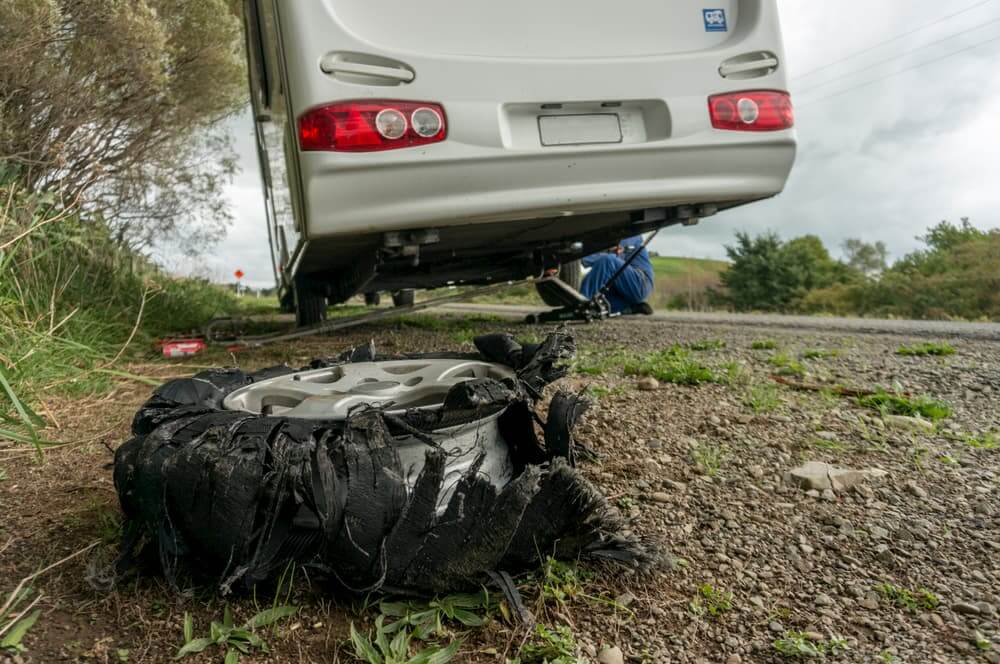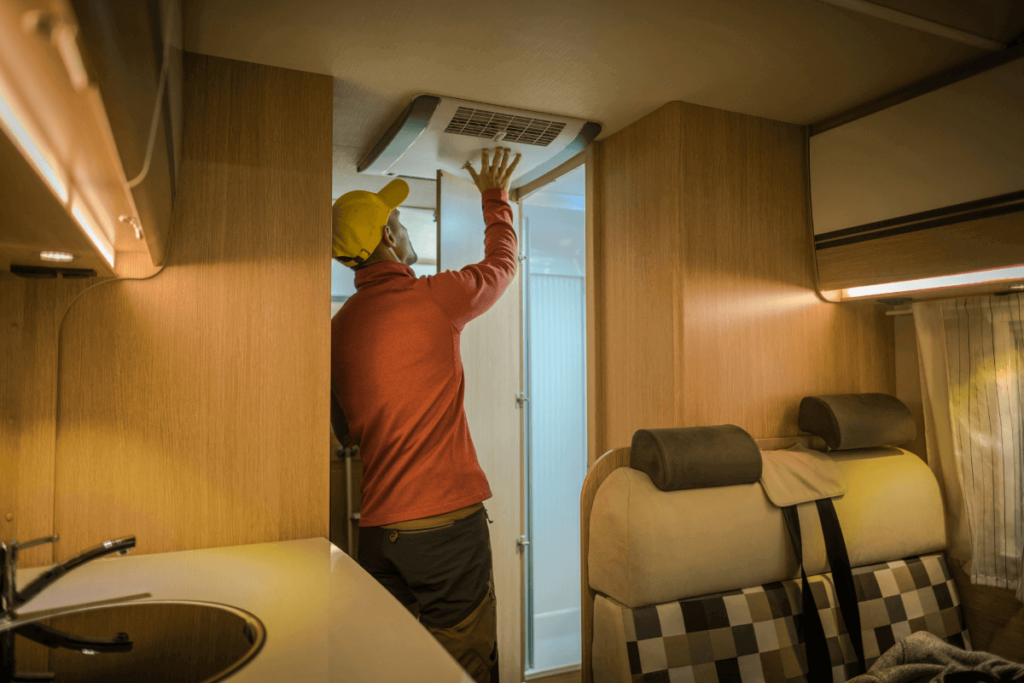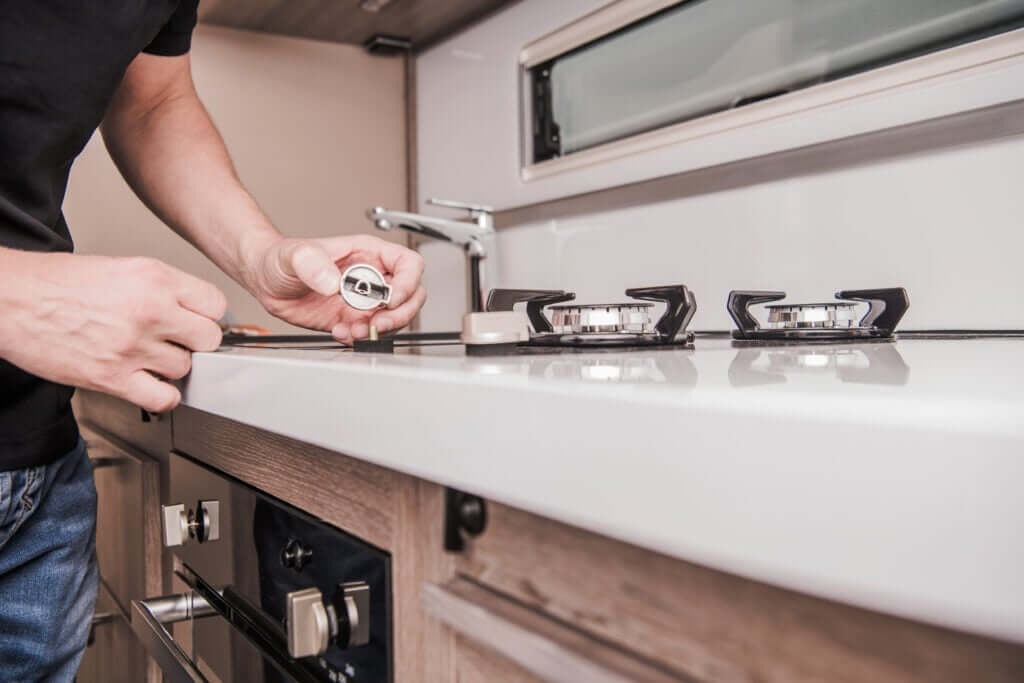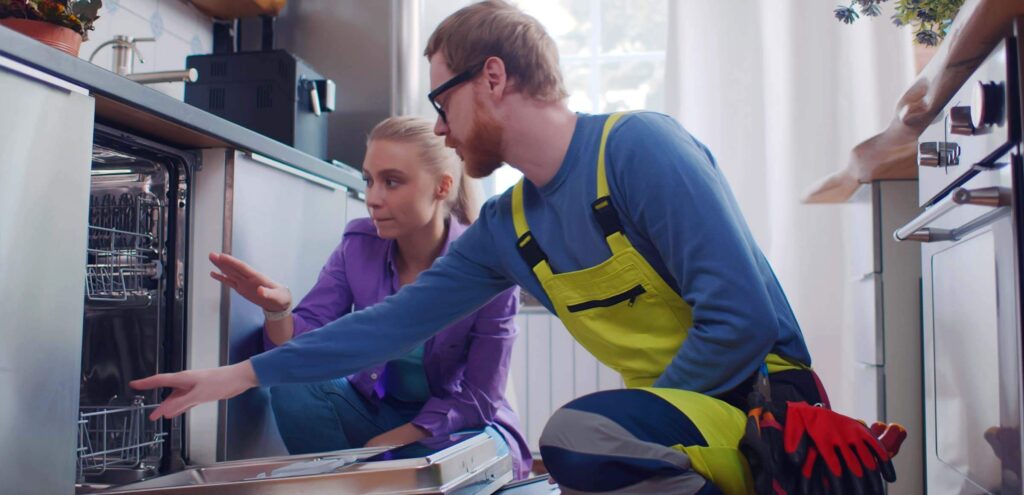
Mobile homes and RVs offer the freedom to roam, taking you wherever the open road leads. But when your trusty appliances on wheels decide to throw in the towel, it can feel like hitting a speed bump on the highway to adventure. Fear not, fellow traveler! We’ve got a toolbox full of tips and tricks to help you navigate the rough terrain of RV appliance repair.
Common RV Appliances and Their Woes
Before we dive into the nitty-gritty, let’s take a look at some common RV appliances and the issues you might encounter on your journey.
| Appliance | Potential Problems |
| Refrigerator | Not cooling, leaking, strange noises |
| Stove/Oven | Burners won’t light, uneven heating |
| Air Conditioner | Weak airflow, strange smells, no cooling |
| Water Heater | No hot water, leaking, pilot light issues |
| Microwave | Not heating, sparks, display problems |
| Toilets | Clogs, leaks, flushing problems |
Now, let’s roll up our sleeves and get to work!
Refrigerator Rescue
Is your fridge feeling a bit frosty or not frosty enough?
Check the Temperature
First, ensure your fridge temperature is set correctly. It might sound obvious, but you’d be surprised how often a simple adjustment can do the trick. Aim for 38-40°F (3-4°C) in the main compartment and 0°F (-18°C) in the freezer.
Clean the Coils
Dusty coils are a common culprit for poor cooling. Grab your vacuum cleaner and give those coils behind or underneath the fridge a good clean. Dust and debris can accumulate and insulate the coils, making it difficult for your refrigerator to expel heat efficiently.
Leaks and Strange Noises
If your fridge is leaking or making odd sounds, it could be a blocked defrost drain. Clear it out, and you might find your fridge humming along again. The defrost drain can get clogged with food particles and ice, preventing water from draining properly. Use a pipe cleaner or a mixture of warm water and vinegar to clear the drain.
Stove/Oven Sizzle
Having trouble firing up your mobile kitchen?
Check the Propane Supply
Ensure your propane tank isn’t empty. If it’s all good, but burners still won’t light, check for obstructions in the burners and igniters. Propane stoves and ovens rely on a steady supply of gas for ignition. Make sure your tank is full and the connections are secure. If the burners won’t light, you may need to clean the burners or check for clogs.
Uneven Heating
For an oven that’s baking unevenly, it could be a faulty igniter or heating element. Get that replaced, and you’ll be back to baking cookies in no time! Uneven heating can lead to undercooked or overcooked dishes. If your oven has hot and cold spots, it’s likely an issue with the heating element. This part can often be replaced, but be sure to consult your oven’s manual for specific instructions.
Cooling Off Your AC Woes
Feeling the heat when your AC is on the blink?
Weak Airflow
A dirty air filter is often the culprit. Replace or clean the filter regularly to keep your RV cool and your AC unit happy. Airflow issues can result from a clogged or dirty air filter. Check your AC unit’s filter and clean or replace it as needed. This is a simple yet crucial maintenance task to ensure your RV stays comfortably cool.
Strange Smells
Musty or odd odors could be due to mold or mildew in the air ducts. Give them a good cleaning to freshen things up. Mold and mildew can develop in the damp, dark recesses of your RV’s air ducts. These contaminants not only create unpleasant odors but also compromise air quality. Cleaning and disinfecting the ducts can eliminate this issue.
No Cooling
If the AC unit isn’t cooling at all, it might be low on refrigerant or have a faulty compressor. These are issues best left to the pros. When your AC unit isn’t producing cold air, it might indicate a refrigerant leak or a malfunctioning compressor. These are complex problems that require the expertise of an HVAC technician or RV service professional.
Water Heater Woes
Cold showers? No thanks!
No Hot Water
If you’re stuck with icy showers, check the pilot light. If it’s out, relight it following the manufacturer’s instructions. Water heaters in RVs often use a propane flame to heat water. If you have no hot water, the pilot light may be out. Follow your water heater’s manual to safely relight the pilot light.
Leaking Water
Water around your water heater? It could be a faulty pressure relief valve or a leaky tank. Time for a repair or replacement. Water heater leaks can be caused by a faulty pressure relief valve or a tank that has corroded or developed a crack. Address this issue promptly to prevent further damage to your RV.
Microwave Mysteries
Don’t let your microwave zap your spirits!
Not Heating
If your microwave isn’t cooking as it should, the magnetron may be the culprit. Replacing it is a job for the experts. Microwaves rely on a component called the magnetron to generate microwaves that heat your food. When the magnetron fails, it’s a complex and potentially hazardous repair best left to professionals.
Sparks and Display Problems
Sparks are a red flag – immediately unplug your microwave. Display issues might be due to control board problems, and that, too, needs professional attention. Sparks in your microwave are dangerous and require immediate action. Unplug the microwave and do not use it until the issue is resolved. Display problems often involve electronic components and should be addressed by a technician.
Toilet Trials
Flush out the problems!
Clogs and Leaks
Toilets can get clogged by waste or even toilet paper. Use a plunger, or a specialized RV toilet wand for clogs. Leaks could be from a faulty seal – replace it. Toilet clogs can occur in RVs, just as in traditional homes. A plunger specifically designed for RV toilets is a handy tool to have. Leaks around the base of the toilet are often due to a deteriorated seal, which can be replaced with a new one.
Flushing Problems
If your toilet isn’t flushing properly, it could be an issue with the flush valve or the flapper. Time for a little DIY toilet surgery! Toilet flush issues can result from problems with the flush valve or the flapper. These components are relatively easy to replace, and many RV owners can tackle this repair themselves.
RV Appliance Repair Essentials

Now that you’ve got the lowdown on common RV appliance problems, let’s talk about the tools and tricks you’ll need to keep your mobile home rolling smoothly.
Essential Tools
- Multimeter: An essential for electrical troubleshooting.
- Screwdriver Set: For opening up panels and accessing components.
- Socket and Wrench Set: To tighten loose bolts and nuts.
- Duct Tape: The handyman’s secret weapon.
- Owner’s Manuals: Don’t underestimate the power of knowledge – keep those manuals handy.
Safety First!
Working on RV appliances can be risky business. Always follow these safety tips:
- Turn Off Power: Ensure all appliances are powered down before working on them.
- Gas Leaks: Be extra cautious with propane appliances; check for gas leaks using soapy water.
- Ventilation: Ensure good airflow when working with gas appliances to prevent carbon monoxide buildup.
When to Call the Pros
While a bit of DIY repair can save you money and time, there are situations when it’s best to leave it to the professionals:
- Gas Appliances: Repairs or maintenance for propane appliances should be handled by experts. Gas appliances require specialized knowledge and equipment to repair and maintain. DIY work on these appliances can be dangerous and may not be up to code.
- Electrical Issues: If you’re not comfortable with electrical systems, don’t risk it; call a professional. Electrical repairs in RVs can be tricky, and mistakes can lead to electrical fires or other hazards. Always seek professional help if you’re unsure.
- Coolant Systems: Problems with AC refrigerants or your RV fridge’s cooling system are best left to the pros. Refrigeration systems, whether in your RV’s fridge or air conditioner, contain refrigerants that require specialized handling and equipment. Leave these repairs to certified technicians.
Your RV is your home on wheels, and keeping it in top shape is essential for a smooth journey. With these tips and tricks up your sleeve, you can tackle common RV appliance issues with confidence. Remember, safety first, and when in doubt, call in the experts.
Whether you’re cruising down the coast, exploring the mountains, or visiting new cities, your RV appliances play a crucial role in making your mobile home feel like, well, home. But just like traditional homes, RVs can experience appliance issues that can put a damper on your adventures. In this comprehensive guide, we’re going to delve even deeper into RV appliance repair, offering more detailed solutions and expert tips to help you keep your RV appliances in tip-top shape.
Taking a Closer Look at RV Appliance Repairs

RVs are equipped with a range of appliances, and just like any home, they can develop problems over time. Let’s explore each appliance category in more detail and discover additional troubleshooting techniques.
Refrigerator Repairs
Problem: Your RV refrigerator isn’t cooling as it should.
Additional Troubleshooting:
- Check the Door Seal: A faulty door seal can allow warm air to enter, making the fridge work harder. Ensure the seal is clean and in good condition.
- Proper Ventilation: Check that there’s enough space behind and around the fridge for proper ventilation. Good airflow is crucial for its efficiency.
- Check the Thermistor: The thermistor controls the temperature. If it’s malfunctioning, the fridge may not cool correctly. Consult your fridge’s manual for instructions on testing and replacing the thermistor.
Stove and Oven Repairs
Problem: Your stove burners are uneven or not lighting properly.
Additional Troubleshooting:
- Clean the Burners: Food debris and grease can accumulate over time. Clean the burners thoroughly to ensure even flames.
- Inspect the Igniter: If the igniter is dirty or damaged, it may not create a spark to light the burner. Clean or replace it if necessary.
- Regulator Check: Ensure the propane regulator is functioning correctly. A malfunctioning regulator can affect the flow of propane to the stove.
Air Conditioner Repairs
Problem: Weak airflow and strange odors from your RV’s AC unit.
Additional Troubleshooting:
- Filter Replacement: Regularly replace or clean the AC filter to maintain good airflow and prevent odors.
- Condensate Drain Cleaning: If you notice musty odors, the condensate drain may be clogged. This can lead to mold growth. Clean the drain and disinfect the drip pan.
- Inspect the Blower Motor: A malfunctioning blower motor can reduce airflow. Test the motor and replace it if necessary.
Water Heater Repairs
Problem: Your RV’s water heater isn’t delivering hot water.
Additional Troubleshooting:
- Pressure Relief Valve: If water is leaking from the pressure relief valve, it may be faulty. Test the valve, and if it doesn’t close properly, replace it.
- Anode Rod Inspection: Check the condition of the anode rod. If it’s heavily corroded, it needs replacement. The anode rod protects the tank from corrosion.
- Pilot Light Adjustment: If the pilot light won’t stay lit, adjust the flame according to the manufacturer’s instructions. It may also indicate the need to clean the pilot assembly.
Microwave Repairs
Problem: Your RV’s microwave isn’t heating or sparks are visible.
Additional Troubleshooting:
- Check the High-Voltage Diode: If the microwave isn’t heating, a faulty diode may be the issue. Test and replace it if necessary.
- Inspect the Stirrer Blade: A malfunctioning stirrer blade can result in uneven heating. Ensure it’s clean and functions correctly.
- Turntable Motor Check: If your microwave has a turntable, test the motor. A malfunctioning motor can affect the evenness of heating.
Toilet Repairs
Problem: Your RV toilet is clogged or leaking.
Additional Troubleshooting:
- Use a Toilet Auger: If a plunger doesn’t work, a toilet auger can help break down and remove clogs deep within the pipes.
- Leak Detection: To find the source of a toilet leak, place dry paper towels around the base of the toilet and flush. The wet towel will indicate the location of the leak.
- Flapper Adjustment: If your toilet flushes poorly, adjust the flapper chain to ensure it opens fully during flushing.
Final Words
Your RV appliances are the lifeblood of your mobile home, ensuring comfort and convenience on your adventures. By following the additional troubleshooting steps and safety considerations outlined in this guide, you can tackle a wide range of appliance issues. Keep your RV in tip-top shape, and when in doubt, don’t hesitate to seek professional assistance. With the right tools and knowledge, you can hit the road with confidence, knowing that you’re well-prepared to handle whatever appliance challenges come your way. Happy travels, and may your RV adventures be filled with smooth sailing and memorable moments!
Frequently Asked Questions (FAQ) About RV Appliance Repair
Q1: How can I prevent common RV appliance problems? A1: Regular maintenance is key. Clean and inspect your appliances, check for leaks, and keep filters and vents clean. Following the manufacturer’s maintenance guidelines can prevent many issues.
Q2: What do I do if my RV refrigerator isn’t cooling properly? A2: Start by checking the temperature settings and cleaning the coils. If the issue persists, consult the manufacturer’s manual for more specific troubleshooting steps.
Q3: Can I repair my RV’s propane stove or oven myself? A3: Yes, for basic issues like cleaning burners or replacing an igniter. However, for complex problems or gas-related issues, it’s safer to have a professional handle the repair.
Q4: What should I do if my RV’s air conditioner isn’t cooling well or has strange odors? A4: Begin by cleaning or replacing the air filter. If that doesn’t solve the issue, consider cleaning the condensate drain. If problems persist, it’s best to consult a professional.
Q5: How can I maintain my RV’s water heater to avoid hot water problems? A5: Regularly check the pressure relief valve and the condition of the anode rod. Keep the tank clean and adjust the pilot light as needed.
Q6: What should I do if my RV microwave isn’t heating properly or sparks inside? A6: Immediately unplug the microwave if you see sparks. For heating issues, you can check the high-voltage diode and inspect the stirrer blade. Always prioritize safety.
Q7: Are there any precautions I should take when working on my RV’s electrical systems? A7: Turn off the power to your RV before working on any electrical components. Use safety gear and consult an expert for complex electrical problems.
Q8: When should I call a professional RV appliance repair service? A8: It’s advisable to call a professional for gas appliance repairs, complex electrical issues, refrigerant leaks, or if you’re unsure about any repair. They have the expertise and equipment to handle these problems safely.
Q9: Can I use regular household appliance repair tools for RV appliances? A9: While some tools overlap, it’s a good idea to have RV-specific tools like a propane leak detector or diagnostics software if your RV appliances are digitally controlled.
Q10: How can I ensure the longevity of my RV appliances? A10: Regularly inspect, clean, and maintain your appliances. Follow the manufacturer’s guidelines for maintenance and consult your RV’s owner’s manual for specific care instructions.
